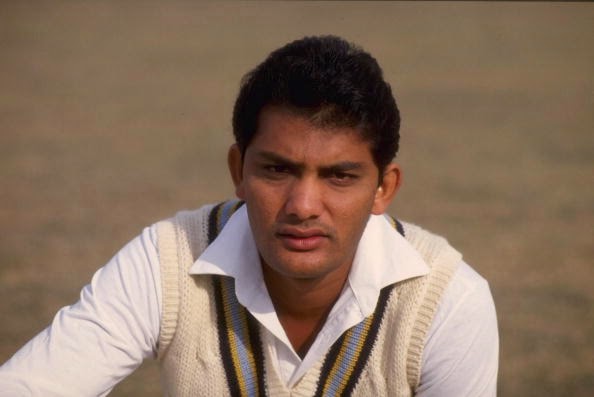Three ‘Tons‘ and more
An interview with Mohammed Azharuddin (1989)
A bird sat on a ceiling fan watched by a little boy and his grandfather. The boy flung a stone at the bird and she flew away, never to return. The old man smacked the boy so that he would learn to be kind with birds. All during his childhood the man was his guardian. He taught the boy more than being kind. He helped him in his Mathematics and encouraged in a sport called Cricket so that one day the boy would be world-famous. The boy would be honored with the Padmashree, his face would dominate magazine covers, and his name would be on television and radio the world over. Mohammed Azharuddin recollected with a sense of gratitude the only incident that seemed to have impressed his mind, squatting casually on his sofa in a modest house lost in the concrete jungle of Himayatnagar.
Inside the house the front room crowded with furniture and memories, there is a photo of Azhar as a child cradled in the arms of his beloved grandfather. Among the memorabilia is a trophy won probably for his school, All Saints High School and a silver shield presented at Calcutta when he hit up his third successive century on debut.
His uncle, Mir Zainul Abiddi led the Nizam College Cricket team in 1967, and encouraged Azhar in his love for the game. But most of all, it was his school that gave the necessary impetus and thrust to his talent.
Little wonder the Azhar bestows unmeasured praise on All Saints, remembering their emphasis on athletics. For him Cricket was everything, studies always secondary, and All Saints School allowed such an attitude. “I had no favorite subjects because I never concentrated on my portions“. By the time he finished his tenth class the dream of playing Big League Cricket had become a firm resolve. Emboldened by a string of successes (National Junior Cricket Championships at. Trivandrum being a major achievement), Azhar could look at Cricket as the means to a career.
Azhar’s routine in Nizam College (where he did B.Com. after completing his Intermediate at Aliya) was College at 9.30, home by 11, back to the playing field at 1. His attendance was lean. He sat by the canteen (“I think its still the same isn‘t it? ‘) chatting with friends. .
Sadly his life on the pitch was mixed with unpleasant surprises. He found the sports scene in the college was entwined in union politics and political rivals would take sides in the field. Soon Azhar found himself in the middle of a raging controversy, which was temporarily resolved by the intervention of elders, his father and the Principal. Azhar recalls that period with regret and one senses the subdued frustration tucked away in some corner of his memory.
But there were fond memories too. Of his grandfather waiting for him to finish practice. Sitting under a tree near the swimming pool eating the tiffin brought by his grand-father, sharing it with his friends. Of his teachers, Azhar remembers Mr Goyal by name, not unusual as this respected and erudite lecturer leaves his mark ell every impressionable commerce student. He also has a recollection of Mr. Suryanarayana, the “Cost Accounts Teacher;’.
While attendance was never a problem as he claimed it under “Cricket practice”, Azhar had a firm policy for his exams. Two months before the date he would start cramming, memorizing all he could. Unfortunately this technique didn’t work in his Final Year exams and he failed in his Statistics and Costing papers. Always passing his exams, Azhar found this black mark hard to bear. He maintains that they were the best papers he wrote, and that the examiner made a gross misjudgment in giving such low marks. On the second try, despite a disinterested attitude and a lack lustre performance, he was given the pass mark, and found himself graduating after all.
Today famous and respected, Azhar looks back at Nizam College without rancour or nostalgia. There’s only calm detachment: Nizam College has passed him on untouched. But then untouched is a key word in Azhar’s life – fame, success, wealth, adulation nothing has changed him.
No one can remain unimpressed by this self-possession, this calm confidence. It springs from a precise knowledge of oneself: an understanding of how much one can do. It is this facet of his personality that enables him to retain his cool on the field. “I never get excited. I do one thing at a time”.
He does not flaunt opinions, or indulge in verbal challenges. But he does believe our upset in the recent World Cup was due to poor batting.
He prefers One day Internationals to Test Cricket for he finds it more interesting and monetarily profitable. On being asked how he felt hitting three centuries on his debut he replied that he was ‘very happy’. His favorite Cricketer? Without hesitation “Dilip Vengsarkar” .
Azaharuddin works as an officer in the State Bank of India, and has helped to mobilize deposits worth several crores through his free testimonials. Why does he need a job in the first place? “Cricket’s not a profession” he says looking momentarily surprised. “You obviously keep your options open”.
“Any message for the college students?” “Anything you do, do it with dedication. Give your best always. As cricketers, we always practice. We know that unless we really sweat, we won’t be giving our best. You have to work hard all the time.”
Prone to relaxing by listening to any music or watching a football match on the TV, Azhar regrets few aspects of his fame though he admits that he does have too many people dropping in when he is in town. Courteous, impeccably mannered, transparently modest, Mohammed Azharuddin is the model son, the one parents point to with pride. The one who fixes goals and meets them through hard work and a sense of balance. Azhar’s wife, Naureen must feel quite elated to share life with such an internationally famous Cricketer, who remains, nevertheless the epitome of simplicity.
And let’s not forget a sense of humor too. As he finishes scrawling out a message and signing with a flourish what must be the umpteenth autograph book, he fields our final question: his favourite pastime? He returns the book, his face blank, looks up and with a twinkle says, of course, “Signing autographs!”
Appeared in “The Collegian” Nizam College, Hyderabad, India. 1989 as “ Three ‘Tons‘ and more” by K.A.Xavier & Nidhi Srinivasan

